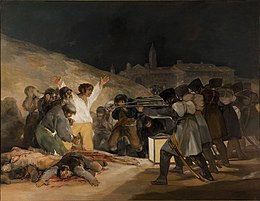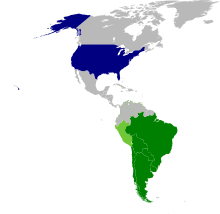
A | B | C | D | E | F | G | H | CH | I | J | K | L | M | N | O | P | Q | R | S | T | U | V | W | X | Y | Z | 0 | 1 | 2 | 3 | 4 | 5 | 6 | 7 | 8 | 9

An extrajudicial killing (also known as an extrajudicial execution or an extralegal killing)[1] is the deliberate killing of a person without the lawful authority granted by a judicial proceeding. It typically refers to government authorities, whether lawfully or unlawfully, targeting specific people for death, which in authoritarian regimes often involves political, trade union, dissident, religious and social figures. The term is typically used in situations that imply the human rights of the victims have been violated; deaths caused by legal police actions (such as self defense)[1] or legal warfighting on a battlefield[2] are generally not included, even though military and police forces are often used for killings seen by critics as illegitimate. The label "extrajudicial killing" has also been applied to organized, lethal enforcement of extralegal social norms by non-government actors, including lynchings and honor killings.
United Nations
Morris Tidball-Binz was appointed the United Nations Special Rapporteur on extrajudicial, summary, or arbitrary executions on 1 April 2021 by the Office of the United Nations High Commissioner for Human Rights (OHCHR).[3][4]
Human rights groups
Many human rights organizations, including Amnesty International and Human Rights Watch, campaign against extrajudicial punishment.[5][6][7][8][9]
The Human Rights Measurement Initiative[10] measures the right to freedom from extrajudicial execution for countries around the world, using a survey of in-country human rights experts.[11]
International law
Law of war
Article 3(d) of the First Geneva Convention explicitly prohibits carrying out executions without passing a prior judgement by a competent and regularly constituted court with all commonly recognized judicial guarantees for everyone taking part in the trial.[12]
Africa
Burundi
Extrajudicial killings and death squads are common in Burundi.[13][14]
Democratic Republic of the Congo
Extrajudicial killings and death squads are common in Democratic Republic of the Congo.[15]
Egypt
Extrajudicial killings and death squads are common in Egypt.[16][17][18][19][20] Egypt recorded and reported more than a dozen unlawful extrajudicial killings of apparent ‘terrorists’ in the country by the NSA officers and the Interior Ministry police in September 2021. A 101-page report detailed the ‘armed militants’ being killed in shootouts despite not posing any threat to the security forces or nations of the country while being killed, which in many cases were already in custody. Statements by the family and relatives of those killed claimed that the victims were not involved in any armed or violent activities.[21]
Eritrea
The 2019 Universal Periodic Review of the United Nations Human Rights Council found that in 2016, Eritrean authorities committed extrajudicial killings, in the context of a "persistent, widespread and systematic attack against the civilian population" since 1991, including "the crimes of enslavement, imprisonment, enforced disappearance, torture, other inhumane acts, persecution, rape and murder".[22]
Ethiopia
Extrajudicial killings and death squads are common in Ethiopia.[23][24][25][26]
Ivory Coast
Extrajudicial killings and death squads are common in Ivory Coast.[27]
Kenya
Extrajudicial executions are common in informal settlements in Kenya.[28] Killings are also common in Northern Kenya under the guise of counter-terrorism operations.[29]
Libya
Extrajudicial killings and death squads are common in Libya.[30]
Americas
Argentina

Argentina's National Reorganization Process military dictatorship during the 1976–1983 period used extrajudicial killings systematically as way of crushing the opposition in the so-called "Dirty War"[31] or what is known in Spanish as La Guerra Sucia. During this violent period, it is estimated that the military regime killed between eleven thousand and fifteen thousand people and most of the victims were known or suspected to be opponents of the regime.[32] These included intellectuals, labor leaders, human rights workers, priests, nuns, reporters, politicians, and artists as well as their relatives.[33][34] Half of the number of extrajudicial killings were reportedly carried out by the murder squad that operated from a detention center in Buenos Aires called Escuela Mecanica de la Armada.[32] The dirty wars in Argentina sometimes triggered even more violent conflicts since the killings and crackdowns precipitated responses from insurgents.[33]
Brazil

Extrajudicial killings and death squads are common in Brazil.[35][36][37][38][39] Senator Flávio Bolsonaro, son of President Jair Bolsonaro, was accused of having ties to death squads.[40]
Chile
When General Augusto Pinochet assumed power in the 1973 Chilean coup d'état, he immediately ordered the purges, torture, and deaths of more than 3,000 supporters of the previous democratic socialist government without trial.[41] During his regime, which lasted from 1973 to 1989, elements of the Chilean Armed Forces and police continued committing extrajudicial killings. These included Manuel Contreras, the former head of Chile's National Intelligence Directorate (DINA), which served as Pinochet's secret police. He was behind numerous assassinations and human rights abuses such as the 1974 abduction and forced disappearance of Socialist Party of Chile leader Victor Olea Alegria. Some of the killings were also coordinated with other right-wing dictatorships in the Southern Cone in the so-called Operation Condor. There were reports of United States' Central Intelligence Agency (CIA) involvement, particularly within its activities in Central and South America that promoted anti-Communist coups.[42] While CIA's complicity was not proven, American dollars supported the regimes that carried out extrajudicial killings such as the Pinochet administration.[42] CIA, for instance, helped create DINA and the agency admitted that Contreras was one of its assets.[43]
Colombia
Extrajudicial killings and death squads are common in Colombia.[44]
An investigation of the Special Jurisdiction for Peace found that from 2002 to 2008, 6402 civilians were killed by the Government of Colombia, falsely claimed to be FARC rebels by the Military Forces of Colombia.[45]
El Salvador
Extrajudicial killings and death squads are common in El Salvador.[46][47][48] During the Salvadoran Civil War, death squads achieved notoriety when far-right vigilantes assassinated Archbishop Óscar Romero for his social activism in March 1980. In December 1980, four Americans—three nuns and a lay worker—were raped and murdered by a military unit later found to have been acting on specific orders. Death squads were instrumental in killing hundreds of peasants and activists, including such notable priests as Rutilio Grande. Because the death squads involved were found to have been soldiers of the Salvadoran Armed Forces, which was receiving U.S. funding and training from American advisors during the Carter administration, these events prompted outrage in the U.S. and led to a temporary cutoff in military aid from the Reagan administration,[citation needed] although death squad activity stretched well into the Reagan years (1981–1989) as well.[citation needed]
Honduras
Text je dostupný za podmienok Creative Commons Attribution/Share-Alike License 3.0 Unported; prípadne za ďalších podmienok. Podrobnejšie informácie nájdete na stránke Podmienky použitia.
Antropológia
Aplikované vedy
Bibliometria
Dejiny vedy
Encyklopédie
Filozofia vedy
Forenzné vedy
Humanitné vedy
Knižničná veda
Kryogenika
Kryptológia
Kulturológia
Literárna veda
Medzidisciplinárne oblasti
Metódy kvantitatívnej analýzy
Metavedy
Metodika
Text je dostupný za podmienok Creative
Commons Attribution/Share-Alike License 3.0 Unported; prípadne za ďalších
podmienok.
Podrobnejšie informácie nájdete na stránke Podmienky
použitia.
www.astronomia.sk | www.biologia.sk | www.botanika.sk | www.dejiny.sk | www.economy.sk | www.elektrotechnika.sk | www.estetika.sk | www.farmakologia.sk | www.filozofia.sk | Fyzika | www.futurologia.sk | www.genetika.sk | www.chemia.sk | www.lingvistika.sk | www.politologia.sk | www.psychologia.sk | www.sexuologia.sk | www.sociologia.sk | www.veda.sk I www.zoologia.sk
